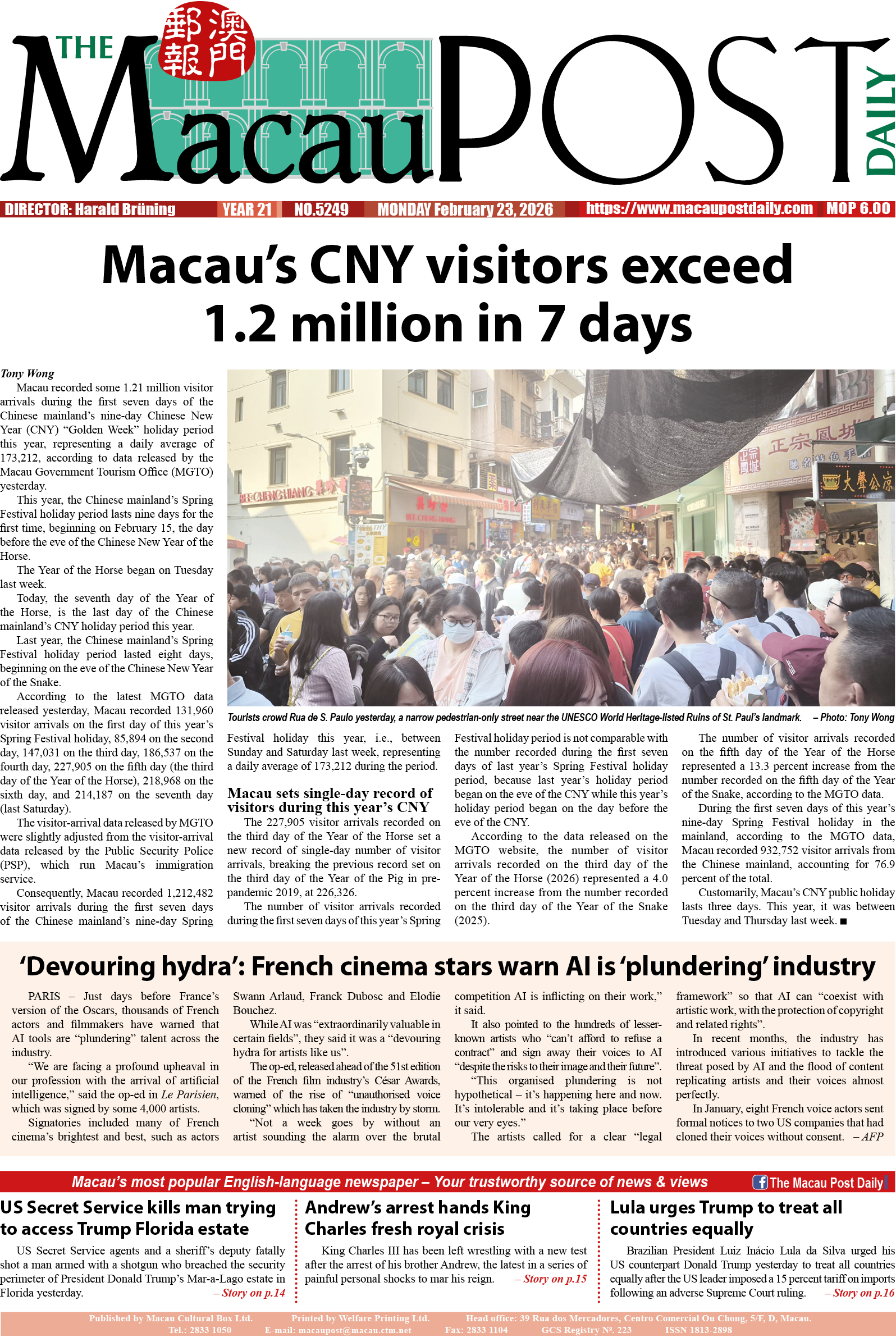The Macau Legislative Assembly (AL) yesterday passed the outline of a local government-drafted bill defining state secrets and regulating their protection in the Macau Special Administrative Region (MSAR).
The current version of Macau’s national security law, Law 2/2009, punishes the theft of state secrets.
The local national security law’s amendment bill, which is currently being reviewed article-by-article by one of the local legislature’s standing committees after its outline was passed by a plenary session last month, proposes to change the name of the crime of “theft of state secrets”, as defined by Article 5 of the current version of Law 2/2009, to “violation of state secrets”.
In addition, the Law 2/2009 amendment bill also proposes that state secrets are to be regulated by a new specific piece of legislation of the MSAR.
Secretary for Administration and Justice André Cheong Weng Chon introduced the outline of the local bill on the protection of state secrets during a plenary session in the legislature’s hemicycle yesterday.
Article 5 of the current version of Macau’s national security law, Law 2/2009, defines state secrets, which refer to documents, information or objects that must be kept secret and are classified as such, in the fields of national defence, foreign relations, or other issues concerning the relationships between the central authorities and the MSAR as set out in the MSAR Basic Law.
In addition, Article 5 of Law 2/2009 also stipulates that the judiciary of the MSAR can ask Macau’s chief executive, or the Central People’s Government through the chief executive, to provide a document certifying whether the relevant documents, information or objects are classified as state secrets.
The local national security law’s amendment bill proposes to remove the definition of state secrets laid out by the law’s current version and proposes that state secrets are to be regulated by a specific piece of legislation, i.e., the bill which was passed by lawmakers yesterday.
During yesterday’s plenary session, Cheong pointed out that the Law 2/2009 amendment bill proposes that state secrets subject to Law 2/2009 are to be defined and regulated by a specific piece of legislation. Consequently, Cheong said, the MSAR government has now completed drafting the bill on the protection of state secrets with the aim of ensuring the adequate and strict protection of state secrets in the MSAR.
According to Cheong, the bill proposes to define state secrets as secret matters concerning national security and interests classified by the central authorities in compliance with the nation’s laws, or by Macau’s chief executive in compliance with this law (i.e., the bill on the protection of state secrets), the knowledge of which is limited to certain groups of people during a certain period of time.
According to the bill, Macau’s chief executive will be entitled to classify a string of various matters that occur or originate from the MSAR as state secrets if their disclosure may jeopardise national security and interest, such as secret matters of the MSAR government’s important decision-making, secret matters of Macau’s socioeconomic development, secret matters of Macau’s scientific and technological development, secret matters of activities safeguarding national security, and secret matters of the local police’s criminal investigations.
According to Cheong, the bill also proposes that classified state secrets can only be kept secret for a maximum of 30 years, depending on the nature and characteristics of the respective secret matters.
After yesterday’s passage of its outline, the bill will be passed to one of the legislature’s standing committees for an article-by-article review, after which it will be resubmitted to another plenary session for its second and final plenary debate and vote.
Cotai hospital bill’s outline also passed
Meanwhile, yesterday’s plenary session also passed the outline of a government-initiated bill regulating the management of its public hospital complex in Cotai, officially known as Islands Healthcare Complex, which will be operated by Peking Union Medical College Hospital (aka Beijing Xiehe Hospital).
The bill proposes that the employment of the Cotai hospital complex’s staff members will be regulated by the city’s labour legal system for the private sector, rather than by the government’s employment system for public servants, with the aim of increasing the flexibility in recruiting highly-qualified health professionals.
“Islands” is the official term for Taipa, Coloane and Cotai together.
Secretary for Social Affairs and Culture Elsie Ao Ieong U introduced the outline of the bill during yesterday’s plenary session.
The Macau government announced in late 2021 that it had decided to commission Peking Union Medical College Hospital (北京協和醫院) to operate the Cotai hospital complex, which is now scheduled to start operating in phases at the end of this year.
Ao Ieong underlined yesterday that the Cotai hospital complex will be operated as a public hospital. She said that half of the medical services provided by the Cotai hospital will be public services with the same operation model as the public Conde de São Januário Hospital Centre, while the other half will be private services that can offer people more diverse options for receiving medical treatment, such as cosmetic surgery.
According to Ao Ieong, income generated by the Cotai hospital’s private medical services will be used to subsidise the operation of its public medical services.

Secretary for Administration and Justice André Cheong Weng Chon addresses yesterday’s plenary session in the Legislative Assembly’s (AL) hemicycle.
– Photo: GCS








